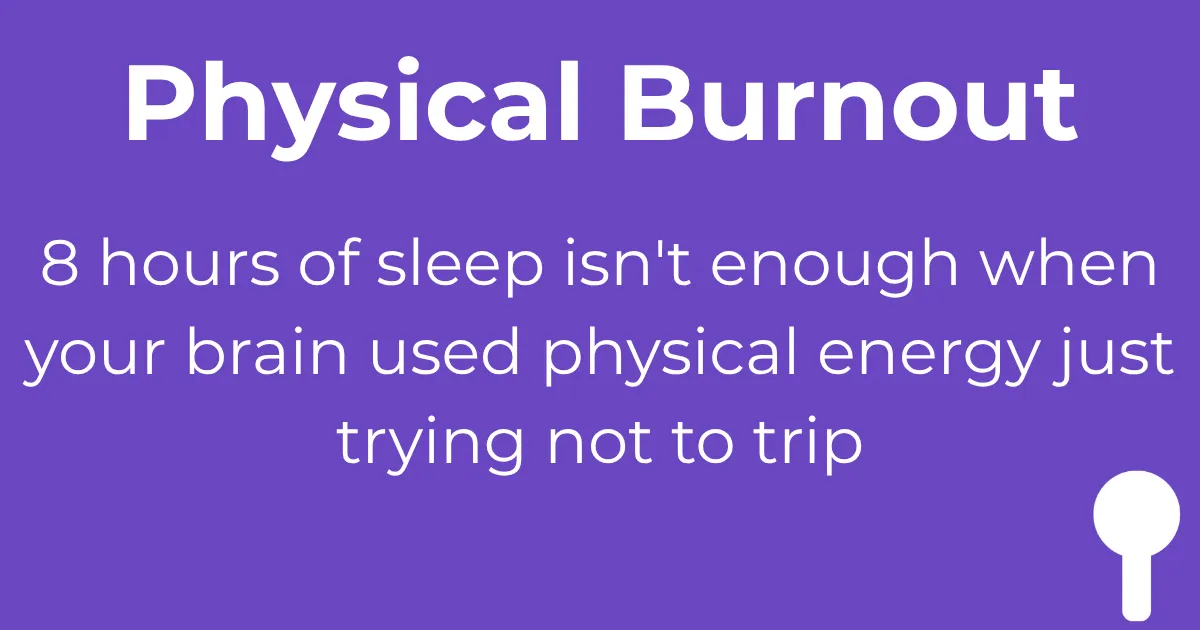
Physical Symptoms Of Autistic Burnout (What it does to my body)
The Problem Nobody Talks About
"I've been in autistic burnout for over 5 years now. Not the "take a weekend off and you'll feel better" kind. The chronic, grinding-down-your-body kind that nobody warns you about when you're trying to survive as an autistic adult in a neurotypical workplace.
Everyone talks about the mental exhaustion. The meltdowns. The shutdowns. But nobody prepared me for what burnout would do to my body.
What it does to my body:
- coordination drops (I trip more)
- legs give out faster on runs
- reaction time feels slower
- mistakes increase at work
- recovery takes days, not one night
My Warehouse Reality
I work three warehouse shifts each week—Sunday, Monday, Tuesday, 10 hours each. Physical work is manageable. It's everything else: micromanagement, forced social conversations, masking—forcing eye contact when my brain screams to just let me work, the executive function drain of counting and scanning when I'm already at 2 energy units
High social pressure weeks? 1-2 runs. Less brutal weeks where people leave me alone? 4-5 runs, easy."
When Your Brain Steals Physical Energy
Here's what shocked me: When I’m burned out, it feels like my brain steals energy from my body when I run.
On 2-energy level days, my legs give out faster. I trip constantly—not clumsiness, but my brain being too exhausted from three days of warehouse mental load to tell my feet where to step.
At work, I'm tripping over boxes, forgetting to scan items, making mistakes that could get me written up. Four write-ups = fired. So I hyper-focus and double-check everything. That mental effort drains me more than the physical work itself.
Zero Energy in Real Life
Zero energy units looks like this:
- silent room
- no conversation
- eyes down if family engages
- grab-and-eat food only (bread/snacks)
- only leaving for water/food
Lying in my room in silence. Not talking to anyone. Looking down if family tries to engage. Eating whatever I can grab—bread, snacks—because planning meals is impossible. I only leave for food or water. Nothing else.
The Recovery That Never Comes
I get 8 hours of sleep. Nowhere near enough. My brain used so much physical energy keeping me safe—not tripping, remembering steps—that 8 hours barely touches the deficit. Takes 3-4 days to recover enough energy to function at work. Running gets cancelled.
The physical symptoms compound: exhaustion → mistakes → anxiety → less energy units→ more mistakes → more anxiety. The loop doesn't break.
Why I Built Spoons
I thought burnout was just being tired. I didn't know my body would give out, that I'd lose coordination, that masking at work would steal the physical energy I need to exist.
This is why I built Spoons. I needed to see the pattern—the 0-energy days after shifts, the 3-4 day recovery timeline, the difference between 2 energy and 6 energy. I needed data to prove to myself that I'm not lazy, I'm not weak, I'm just autistic and burnt out and my body is drained because of it.
When I track my energy—even on paper—I’m not overthinking. I’m surviving.
I'm Omari, a 23-year-old autistic adult who's been managing chronic burnout for 5+ years while working warehouse shifts.
I’m building Spoons to track these patterns before it drains my energy baseline even lower.
Launching April 2026. getspoons.app - One email when it's ready. No spam.
Note: I'm sharing my personal experience as an autistic adult, not medical advice. If you're experiencing severe burnout or crisis, please consult a healthcare provider familiar with autism.
